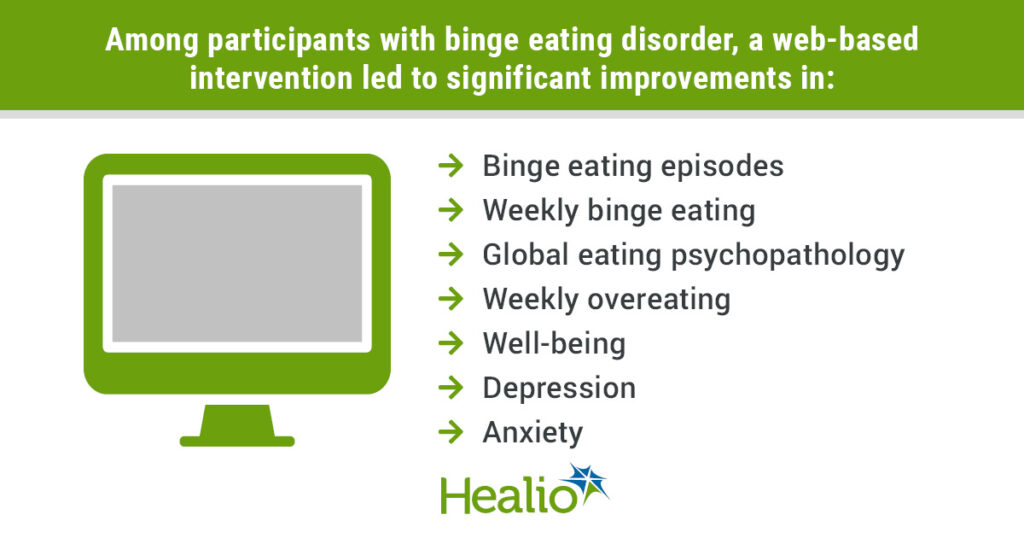Add topic to email alerts
Receive an email when new articles are posted on
Please provide your email address to receive an email when new articles are posted on .
“
data-action=”subscribe”>
Subscribe
We were unable to process your request. Please try again later. If you continue to have this issue please contact customerservice@slackinc.com.
Back to Healio
Key takeaways:
Among intervention participants, binge eating episodes decreased from 14.79 to 6.07 over 12 weeks.
The intervention was also tied to enhanced quality of life and low dropout rates.
A web-based cognitive behavioral self-help intervention led to significant reductions in binge eating episodes, along with improvements in several other measures, a randomized clinical trial showed.
Prior research has shown that medical claims for binge-eating disorders (BED) rose 81% from 2018 to 2022.

Data derived from: Pruessner L, et al. JAMA Netw Open. 2024;doi:10.1001/jamanetworkopen.2024.11127.
According to Luise Pruessner, MS, from Heidelberg University in Germany, and colleagues, there is a significant treatment gap for BED due to barriers like clinician unawareness, sociocultural stigma and treatment costs.
However, “the rapid evolution of technology provides new avenues for delivering interventions that can address this gap and make evidence-based BED treatments more accessible,” they wrote in JAMA Network Open. “Web-based cognitive behavioral interventions have gained prominence due to their advantages in terms of availability, cost-effectiveness, ease of implementation, and reduced social stigma, thereby circumventing the barriers of conventional BED treatments.”
In the study, the researchers randomly assigned 154 German patients (mean age, 35 years; 96.1% women) who met the criteria for BED to either a 12-week intervention or a wait-list control group.
The intervention consisted of six modules on self-monitoring of binge eating, psychoeducation and emotion regulation, as well as six elective modules that were tailored to each participant’s preferences, Pruessner and colleagues wrote. The researchers emailed reminders to participants who were late in starting the program to improve engagement.
Overall, compared with the control group, the intervention group had improvements in:
binge eating episodes (Cohen’s d = 0.79; 95% CI, 1.17 to 0.42);
global eating psychopathology (Cohen’s d = 0.71; 95% CI, 1.07 to 0.35);
weekly binge eating (Cohen’s d = 0.49; 95% CI, 0.74 to 0.24);
weekly overeating (Cohen’s d = 0.44; 95% CI, 0.69 to 0.18);
clinical impairment (Cohen’s d = 0.75; 95% CI, 1.13 to 0.37);
well-being (Cohen’s d = 0.38; 95% CI, 0.01-0.75);
depression (Cohen’s d = 0.49; 95% CI, 0.86 to 0.12);
anxiety (Cohen’s d = 0.37; 95% CI, 0.67 to 0.07);
self-esteem (Cohen’s d = 0.36; 95% CI, 0.13-0.59); and
emotion regulation difficulties (Cohen’s d = 0.36; 95% CI, 0.65 to 0.07) and repertoire (Cohen’s d = 0.52; 95% CI, 0.19-0.84).
After 12 weeks, the mean number of binge eating episodes decreased from 14.79 at baseline to 6.07 among intervention participants.
The researchers noted that the findings show the potential of digital interventions to improve participants’ daily lives “by addressing core eating-related symptomatology and the emotional and psychological mechanisms frequently linked with BED.”
They also highlighted a low dropout rate (17.53%) among participants, which demonstrated study robustness.
“Providing these programs to those in need of treatment can contribute to alleviating the burden that BED places on patients, their families, and society,” the researchers concluded.
Add topic to email alerts
Receive an email when new articles are posted on
Please provide your email address to receive an email when new articles are posted on .
“
data-action=”subscribe”>
Subscribe
We were unable to process your request. Please try again later. If you continue to have this issue please contact customerservice@slackinc.com.
Back to Healio

